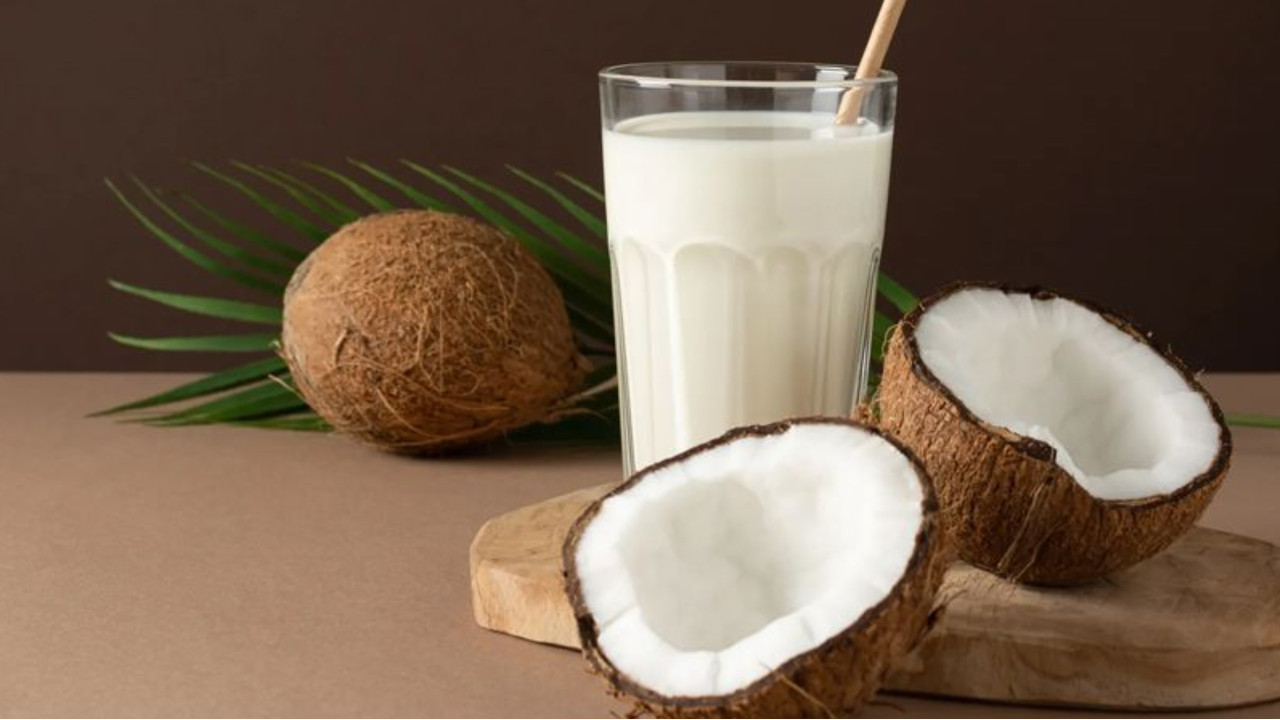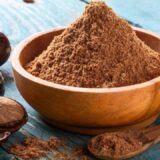Coconut Milk in Ayurveda: The Secret to Skin, Hair, and Digestion
Ayurveda, the ancient Indian system of holistic medicine, emphasizes harmony between body, mind, and environment through diet, lifestyle, and herbal remedies. Among its vast pharmacopeia of natural ingredients, coconut milk has emerged as a versatile and nourishing substance, particularly in modern Ayurvedic practice.
While the coconut itself (known as nariyal or tengai in Sanskrit) has been celebrated in classical texts like the Bhavaprakasha and Charaka Samhita for its cooling and rejuvenating properties, coconut milk—a creamy extract from mature coconut flesh—is a contemporary adaptation of this tropical treasure.
Introduction to Coconut Milk in Ayurveda
Coconut milk is derived by grating the white flesh of mature coconuts, soaking it in warm water, and straining the liquid. Unlike coconut water, which is found in young green coconuts and is electrolyte-rich, coconut milk contains higher fat content and a creamy texture, making it a staple in tropical cuisines and Ayurvedic therapies.
Historically, Ayurvedic texts mention the coconut palm as Kalpa Vriksha (“tree of life”) for its myriad uses—its water, oil, and flesh were employed to treat dehydration, burns, and digestive disorders. However, coconut milk as we know it today is rarely cited in classical scriptures.
Instead, its applications have evolved through regional practices in South India and Sri Lanka, where coconut-based diets are prevalent. Modern Ayurvedic practitioners now recognize coconut milk as a potent rasayana (rejuvenative), particularly for pacifying heat-related imbalances and supporting tissue nourishment.
Synonyms for Coconut
The synonyms for Coconut from different languages and regions:
- Cocos nucifera (scientific name)
- Narikela (Sanskrit)
- Khopra (Hindi)
- Narkel (Bengali)
- Coconut Palm (common English term)
- Naliar (Tamil)
- Nariyel (Gujarati)
- Shriphal (Marathi)
- Koprun (Kannada)
- Nariyal (Hindi)
- Gola (Malayalam)
- Khobbari (Telugu)
- Tengnamara (Assamese)
- Temgu (Odia)
- Thengu (Tamil)
- Thenginamara (Tamil)
- Nalikeram (Malayalam)
- Ten (Tulu)
- Thengu (Kannada)
- Keram (Marathi)
- Naral (Marathi)
- Narela (Marathi)
- Garigola (Tulu)
- Tenkai (Tamil)
- Kopparai (Tamil)
- Narikelamu (Telugu)
- Tenkay (Malayalam)
- Kobbari (Telugu)
- Narjil (Hindi)
- Narial (Hindi)
These synonyms reflect the various names for coconut in different languages across India and beyond as well as some common terms used in other regions.
Ayurvedic Properties: Gunas and Dosha Effects
Ayurveda classifies substances based on their gunas (qualities) and their impact on the three doshas. Coconut milk’s properties make it uniquely suited for balancing specific constitutional needs.
Primary Gunas (Qualities):
- Heavy (Guru): Its rich, creamy texture provides deep nourishment but can be challenging to digest in excess.
- Cooling (Sheeta): Ideal for countering inflammation, acidity, and overheating.
- Oily (Snigdha): Lubricates tissues, joints, and the digestive tract.
- Sweet (Madhura): Strengthens and calms the nervous system.
Elemental Composition: Coconut milk is dominated by Earth (Prithvi) and Water (Jala). coconut milk grounds the body and enhances moisture.
Dosha Influence:
Pacifies Vata and Pitta:
- Vata’s dry, erratic nature benefits from coconut milk’s unctuousness and sweetness.
- Pitta’s fiery tendencies are cooled by its soothing, anti-inflammatory properties.
Aggravates Kapha: Excessive consumption may increase mucus, lethargy, or weight gain due to its heaviness.
Dosha-Specific Recommendations
1. Vata Dosha:
Characteristics: Vata is prone to dryness, cold, and irregularity.
Recommendation: Coconut milk’s rich, creamy texture and cooling nature help balance Vata’s dry and light qualities. It can be used in:
- Warm, spiced beverages (such as chai or turmeric lattes) to provide moisture and warmth.
- Oatmeal: The richness of coconut milk can nourish the body and help ground Vata’s airy, light energy.
2. Pitta Dosha:
Characteristics: Pitta is hot, sharp, and prone to inflammation or excess heat.
Recommendation: Coconut milk’s cooling properties make it ideal for Pitta. It helps soothe excess heat in the body. Use it in:
- Raw or chilled smoothies: Perfect for balancing Pitta’s fiery nature while keeping you cool.
- Kitchari: Coconut milk can replace dairy to create a soothing, cooling dish that supports digestion and reduces heat.
3. Kapha Dosha:
Characteristics: Kapha is heavy, slow, and prone to congestion.
Recommendation: While coconut milk is nourishing, it can be too heavy for Kapha if consumed in excess. Use it sparingly, and consider:
- Diluted versions: Thin out coconut milk with water to reduce heaviness.
- Spices: Adding black pepper or cinnamon can help stimulate digestion and balance Kapha’s slow metabolism and heaviness.
By adjusting how you use coconut milk according to your dosha, you can enhance its benefits and ensure it aligns with your unique constitution and needs.
Classification of Narikela (Coconut)
Narikela (coconut) is classified into various Vargas (groups) and Ganas (categories) in classical Ayurvedic texts, highlighting its significance in traditional medicine. Below is a breakdown of its classification according to different Nighantus:
- Amraphalaadi Varga – Bhavaprakasa Nighantu
This classification places coconut among fruits used for their nourishing and rejuvenating qualities in Ayurveda. It emphasizes the role of coconut in promoting overall wellness and vitality. - Oushadhi Varga – Kaiyadeva Nighantu
In the Oushadhi Varga, coconut is considered a medicinal herb known for its therapeutic effects on various bodily functions. It is used in formulations aimed at balancing doshas and supporting health. - Phala Varga – Charaka Samhita
Under the Phala Varga of Charaka Samhita, coconut is acknowledged as a fruit that aids in digestion and nourishment, contributing to overall health and well-being. - Phala Varga – Madanapala Nighantu
In this classification, coconut is grouped with other fruits known for their health benefits. It is used for promoting digestion, soothing the stomach, and improving general vitality. - Vanoushadhi Varga – Amarakosha
Coconut, in the Vanoushadhi Varga of Amarakosha, is considered a valuable wild medicine. It’s recognized for its versatile uses in both external and internal healing practices. - Phala Varga – Hareethakyadi Nighantu
Coconut is part of the Phala Varga in the Hareethakyadi Nighantu, where it is classified for its cooling and soothing properties, especially beneficial for skin and digestive health. - Amradi Panchamo Varga – Dhanwanthari Nighantu
In the Amradi Panchamo Varga, coconut is linked with rejuvenating and restoring treatments. It is known for its balancing properties, especially in the context of Vata and Pitta doshas. - Hareethakyadi Varga – Priya Nighantu
Coconut in this classification is valued for its ability to calm inflammation and support digestive functions. It’s included for its purifying and soothing actions in Ayurvedic practice. - Madhura Dravya Skandham – Sadrasa Nighantu
Under Madhura Dravya Skandham in the Sadrasa Nighantu, coconut is recognized for its sweet taste and its therapeutic benefits, particularly in nurturing and replenishing bodily tissues. - Amradi Varga – Sodhala Nighantu
Coconut is classified under the Amradi Varga in the Sodhala Nighantu for its beneficial qualities that align with rejuvenation and nourishment, particularly in Ayurvedic rejuvenation therapies.
These classifications emphasize the diverse uses and therapeutic benefits of coconut in Ayurveda, ranging from promoting overall health to treating specific ailments. It has been recognized across various ancient texts for its medicinal value and versatile applications.
Nutritional and Energetic Profile
Coconut milk is rich in medium-chain triglycerides (MCTs), which are easily metabolized for energy. It also contains vitamins C, E, and B-complex, along with minerals like iron, magnesium, and potassium.
1. Vitamins: Coconut milk is a source of several essential vitamins:
- Vitamin C: An antioxidant that supports the immune system and collagen production.
- Vitamin E: A powerful antioxidant for skin health and protection against free radicals.
- B-Complex Vitamins: Including B1, B3, B5, and B6, which help in energy production, nerve function, and overall metabolism.
2. Minerals: Rich in essential minerals like:
- Iron: Crucial for oxygen transport in the blood.
- Magnesium: It supports muscle and nerve function, as well as bone health.
- Potassium: Vital for regulating fluid balance, muscle contractions, and nerve signaling.
3. Energetic Effects (Ayurvedic Perspective)
- Virya (Energetic Effect): Cooling – Coconut milk has a cooling effect on the body, making it ideal for soothing inflammation or reducing excess heat in the body (e.g., during hot weather or when dealing with conditions like pitta imbalances).
- Vipaka (Post-Digestive Effect): Sweet – The sweetness of coconut milk helps stabilize blood sugar levels, providing sustained energy and promoting the repair of tissues.
4. Ideal For:
- Replenishing Fluids and Electrolytes: Coconut milk is excellent for hydration, helping to restore electrolytes and maintain fluid balance, especially after physical activity.
- Supporting Muscle and Nerve Function: The combination of magnesium, potassium, and MCTs supports muscular health and the efficient functioning of the nervous system.
- Enhancing Skin and Hair Health: With its rich vitamin and fat content, coconut milk can nourish skin and hair, helping to maintain moisture, elasticity, and a healthy appearance.
Coconut Milk According to Bhojana Kutuhalam
In the eighth chapter of Bhojana Kutuhalam, the preparation of a nourishing dish involving coconut pulp is described. The process involves adding small pieces of coconut pulp to cow’s milk, ghee (derived from cow’s milk), and sugar. This mixture is then cooked over a low flame to create a rich, nourishing preparation.
Properties of Coconut Milk Derived from Coconut Pulp
According to Ayurvedic principles, the milk extracted from coconut pulp is described as follows:
1. Unctuous (Snigdha): The milk is rich and oily, providing deep nourishment.
2. Cold (Ushna): It has a cooling effect on the body, making it ideal for balancing excess heat or Pitta dosha.
3. Extremely Nourishing (Rasayana): The milk is highly nourishing, promoting vitality and overall health.
4. Heavy to Digest (Guru): Due to its rich consistency, coconut milk can be a bit difficult to digest, so it should be consumed in moderation, especially for those with digestive issues.
5. Very Sweet in Taste (Madhura): It has a naturally sweet flavor, which helps balance other tastes and is calming to the body.
6. Aphrodisiac (Vajikarana): It is considered to have aphrodisiac properties, helping to enhance vitality and vigor.
Therapeutic Effects
Coconut milk is believed to have a significant impact on balancing the doshas, particularly for the following:
7. Treats Vitiated Rakta (Blood): Coconut milk helps in cleansing and balancing the blood, supporting overall health.
8. Balances Pitta and Vata: It is effective in pacifying Pitta (which governs heat and inflammation) and Vata (which governs movement and dryness), making it ideal for those with imbalances in these doshas.
Coconut milk, as per Bhojana Kutuhalam, is seen as a deeply nourishing and therapeutic food, with a cooling and soothing effect on the body.
It is recommended for enhancing vitality, balancing doshas, and providing nourishment, especially when combined with other ingredients like milk, ghee, and sugar.
Top 10 Coconut Milk Benefits
Coconut milk offers various health benefits, particularly for conditions related to Vata imbalances. Some of its key therapeutic effects include the following:
1. Relieves Emaciation: Coconut milk is nourishing and helps to build up strength and body mass, making it beneficial for individuals experiencing emaciation or underweight conditions.
2. Vata Disorders (Neuro-Muscular Disorders): Due to its cooling and hydrating properties, coconut milk is helpful in balancing Vata dosha, which governs the nervous and muscular systems. It can alleviate issues like nervous tension, muscle spasms, and general Vata imbalances.
3. Mamsakshaya (Muscular Dystrophy): The nourishing and hydrating qualities of coconut milk make it a good food for individuals dealing with muscular dystrophy (Mamsakshaya), a condition involving the gradual loss of muscle tissue.
4. Shukra Kshaya (Oligospermia): Coconut milk supports the reproductive system, promoting the health of Shukra (semen), and can be beneficial for conditions like oligospermia (low sperm count), by nourishing the tissues and improving vitality.
5. Shirashoola (Headache): Coconut milk’s cooling and soothing properties make it an excellent remedy for headaches, particularly those caused by Pitta imbalances (excess heat or inflammation).
6. Katigraha (Backache): For individuals with Katigraha (back pain), coconut milk can help relax muscles and ease discomfort due to its nourishing and anti-inflammatory effects.
7. Supports Digestion: Coconut milk can soothe and support the digestive system. It has anti-inflammatory properties that can help calm irritated digestive tissues, making it useful for conditions like acid reflux or gastritis.
8. Promotes Skin Health: Rich in vitamins and minerals like Vitamin E, coconut milk hydrates and nourishes the skin. It can be used both internally and externally to improve skin texture, prevent dryness, and promote a healthy glow.
9. Boosts Immunity: The lauric acid in coconut milk has antimicrobial and antiviral properties, which can help boost the immune system and protect the body from infections.
10. Regulates Blood Sugar: Due to its low glycemic index and high fat content, coconut milk can help stabilize blood sugar levels, making it beneficial for individuals with diabetes or those looking to maintain steady energy levels throughout the day.
With these additional benefits, coconut milk continues to showcase its versatility in supporting both internal health and external beauty. It can be used in a variety of ways to nourish the body and maintain balance.
Coconut Milk for Skin, Hair, and Digestive Health
Coconut milk has been cherished in Ayurveda for centuries, not only as a food but as a holistic remedy for promoting beauty, wellness, and vitality.
Packed with essential nutrients, healthy fats, antioxidants, and vitamins, it helps nourish the body both internally and externally. Here’s how coconut milk can enhance skin, hair, and digestive health:
1. Coconut Milk for Skin Health
In Ayurveda, the skin is seen as a reflection of internal balance, and coconut milk is renowned for its cooling, hydrating, and anti-inflammatory properties. Here’s how you can use it:
As a Facial Cleanser:
- How to Use: Mix coconut milk with a few drops of honey and a pinch of turmeric. Apply to your face, massage in gentle circular motions, and rinse with lukewarm water.
- Benefits: This natural cleanser hydrates, reduces inflammation, and helps clear up blemishes, giving your skin a healthy glow.
As a Moisturizer:
- How to Use: After cleansing, apply pure coconut milk directly to your face and body, especially to dry or irritated areas.
- Benefits: It deeply moisturizes, soothes, and nourishes the skin, making it soft and supple.
Radiance Face Mask:
- How to Use: Combine coconut milk with oatmeal and a pinch of turmeric. Apply it as a mask for 15-20 minutes, then rinse with cool water.
- Benefits: This mask helps brighten the skin, even out skin tone, and soothe irritation.
Soothing Sunburn Relief:
- How to Use: Apply coconut milk directly to sunburned or irritated skin.
- Benefits: Its cooling properties provide instant relief from redness and inflammation.
2. Coconut Milk for Hair Health
Coconut milk is an excellent hair care ingredient in Ayurveda, nourishing both the scalp and hair follicles. It helps hydrate, strengthen, and protect the hair. Here’s how to use it:
Hair Mask for Moisture & Shine:
- How to Use: Mix coconut milk with a tablespoon of honey and a few drops of essential oils (like lavender or rosemary). Apply to your hair, focusing on the ends. Leave for 30 minutes to an hour before rinsing.
- Benefits: This mask deeply hydrates, strengthens, and nourishes your hair, promoting a natural shine and preventing split ends.
Scalp Treatment for Balance:
- How to Use: Massage warm coconut milk into your scalp, then leave it on for 20-30 minutes. Cover your hair with a shower cap and rinse thoroughly.
- Benefits: It helps balance excess heat and pitta dosha on the scalp, promoting healthy hair growth and alleviating scalp irritation.
Pre-Shampoo Conditioner:
- How to Use: Apply coconut milk as a deep conditioner before shampooing. Leave it on for 10-15 minutes, then rinse and shampoo as usual.
- Benefits: It locks in moisture, softens hair, and adds strength, making it less prone to breakage.
Prevention of Premature Graying:
- How to Use: For added nourishment, mix coconut milk with amla (Indian gooseberry) powder and apply it to the scalp and hair.
- Benefits: This combination helps reduce oxidative stress and prevent premature graying, promoting healthier hair.
3. Coconut Milk for Digestive Health
Coconut milk is considered soothing and balancing in Ayurveda, especially for calming digestive disturbances and promoting gut health. Here’s how to use it for digestive well-being:
Coconut Milk Smoothie:
- How to Use: Blend 1 cup of coconut milk with fruits (banana, berries), spinach, and chia seeds. Add honey to sweeten if desired.
- Benefits: A great way to improve digestion and support gut health. The fats in coconut milk help with nutrient absorption, while the fruit and spinach provide fiber for smooth digestion.
Coconut Milk in Tea or Coffee:
- How to Use: Add coconut milk to your herbal teas or coffee for a creamy, soothing drink. Try it with ginger and turmeric for extra digestive benefits.
- Benefits: This combination helps reduce acidity, soothe the stomach, and calm any digestive discomfort.
Coconut Milk in Soups or Curries:
- How to Use: Use coconut milk as a base for soups or curries, combining it with digestive-friendly spices like cumin, coriander, and ginger.
- Benefits: It improves digestion by cooling the body and supporting the gut, while the spices enhance Agni (digestive fire).
Digestive Tonic Drink:
- How to Use: Mix ½ cup of coconut milk with a pinch of cumin powder and black pepper. Warm slightly and drink after meals.
- Benefits: This helps balance digestive processes, reduces bloating, and supports healthy digestion.
How to Prepare Coconut Milk – Indian Method
There are several ways to prepare coconut milk using the traditional Indian method; below are a few of them.
Method 1: Traditional Hand-Grated Method
- Grate the Coconut: Use a grater to finely grate fresh coconut.
- Collect the Grated Coconut: Gather the grated coconut into a clean container.
- Prepare a Thin Cloth: Take a clean, thin cloth (or cheesecloth) and place the grated coconut inside.
- Squeeze to Extract Milk: Twist and squeeze the cloth to extract the coconut milk into a clean vessel. Ensure you apply enough pressure to extract as much liquid as possible.
Method 2: Blender/Modern Method
- Grate or Chop the Coconut: Grate the coconut or chop it into small pieces to make blending easier.
- Blend the Coconut: Place the grated or chopped coconut in a mixer or blender. Grind it for 3-5 minutes, until it forms a smooth paste.
- Filter the Paste: After grinding, strain the coconut paste through a fine cloth or sieve to filter out the milk.
- Collect the Coconut Milk: The coconut milk will drain into a clean vessel. You can squeeze the paste further to get every drop of milk.
Both methods are effective in extracting fresh coconut milk. The first method gives a more traditional, hands-on approach.
The second method is quicker and works well if you’re short on time. You can use the coconut milk immediately or store it for later use in cooking, smoothies, or skincare!
Coconut Milk Remedies
Remedy 1: Coconut Milk Energy and Aphrodisiac Drink
Ingredients:
- 1 cup of coconut milk
- 1 teaspoon of jaggery
- 1 gram of cardamom
- 1 strand of saffron
Preparation:
- Dissolve 1 teaspoon of jaggery into 1 cup of coconut milk.
- Add 1 gram of cardamom and a strand of saffron to the mixture.
- Mix well until everything is thoroughly combined.
Benefits:
- Instant Energy Boost: This drink acts as an excellent energy booster due to the natural sugars and rich fats in coconut milk.
- Aphrodisiac: Known to enhance libido, making it a great natural aphrodisiac.
- Coolant: Helps cool the body, making it ideal for hot weather or Pitta imbalances.
- Promotes Sleep: This remedy is beneficial for people who have trouble sleeping, as it calms the nervous system and promotes relaxation.
- Relieves Back Pain: Regular intake at night can help reduce back pain.
- Helps with Body Weight: It supports healthy weight management when consumed regularly.
- Note: Avoid this remedy for diabetic patients due to the presence of jaggery.
Serving Suggestions:
- Serve with dishes like Dosa, Idly, or Rice noodles for a cooling and soothing effect.
Remedy 2: Coconut Milk and Wheat Milk Nutritive Recipe
Ingredients:
- 1 cup of coconut milk
- 1 cup of wheat milk (soaked wheat, squeezed through a cloth)
- 1 teaspoon of ghee
- Sugar or jaggery (to taste)
- 1 gram each of cardamom, clove, cinnamon leaf and bark
- 1 strand of saffron
Preparation:
- Mix 1 cup of coconut milk and 1 cup of wheat milk together in a pan.
- Heat the mixture and cook until it thickens.
- Add 1 teaspoon of ghee and sweeten with sugar or jaggery as desired.
- Continue heating until the mixture reaches a semi-solid consistency, like a cake.
- Add 1 gram each of cardamom, clove, cinnamon leaf and bark, and 1 strand of saffron.
- Mix well and cook until fully blended.
Benefits:
- Nutritive for Growing Children: This recipe is highly nourishing and ideal for children due to its rich nutritional profile, promoting healthy growth and development.
Remedy 3: Coconut Milk and Ghee for Backache and Urinary Health
Ingredients:
- 50 ml coconut milk
- 100 ml cow’s ghee
- 400 ml coconut water
- 50 grams of sugar
- 1 gram of cardamom
- 1 gram of clove
- 1 gram of cinnamon leaf and bark
- 1 strand of saffron
Preparation:
- Combine 50 ml of coconut milk, 100 ml of cow’s ghee, and 400 ml of coconut water in a pan.
- Cook the ghee on mild heat until it is free of water content, then remove it from the heat and filter.
- Add 50 grams of sugar to the filtered mixture while it is still warm, and mix thoroughly.
- Add 1 gram each of cardamom, clove, cinnamon leaf and bark, and 1 strand of saffron to the mixture.
Dosage:
- Take 5 grams of this mixture daily, along with warm water or warm milk.
Benefits:
- Backache: Effective for alleviating back pain due to its anti-inflammatory and soothing properties.
- Urinary Health: Helps with burning sensation while passing urine, urinary tract infections (UTIs), and urinary calculi (kidney stones).
- Leucorrhoea and Fatigue: Useful in treating leucorrhoea (vaginal discharge) and general fatigue.
- Burning Sensation: Alleviates the burning sensation caused by UTIs or other urinary issues.
These remedies make use of coconut milk’s nutritional and therapeutic properties, offering a range of benefits from promoting energy and sleep to supporting digestive and urinary health.
Precautions for Coconut Milk Consumption
- Overconsumption: Excessive intake of coconut milk can lead to weight gain or congestion, especially for those with a Kapha imbalance, as it is heavy and nourishing in nature.
- Avoid with Severe Ama or Sluggish Digestion: If there is ama (toxicity) or sluggish digestion present in the body, it’s best to avoid coconut milk, as its richness and heaviness can exacerbate these conditions by being harder to digest.
- Interaction with Pungent Herbs: Coconut milk may reduce the potency of pungent herbs like cayenne pepper, so it’s wise to pair it carefully with such herbs. The cooling and soothing properties of coconut milk can dampen the heat and intensity of these herbs, potentially interfering with their therapeutic effects.
Coconut milk bridges ancient wisdom and modern needs, offering a nourishing, cooling remedy for today’s fast-paced world. By aligning its use with one’s prakriti (constitution) and seasonal needs, it becomes a powerful tool for holistic wellness. As Ayurveda teaches, balance is key: even the most benevolent substances require mindful consumption.
References

























